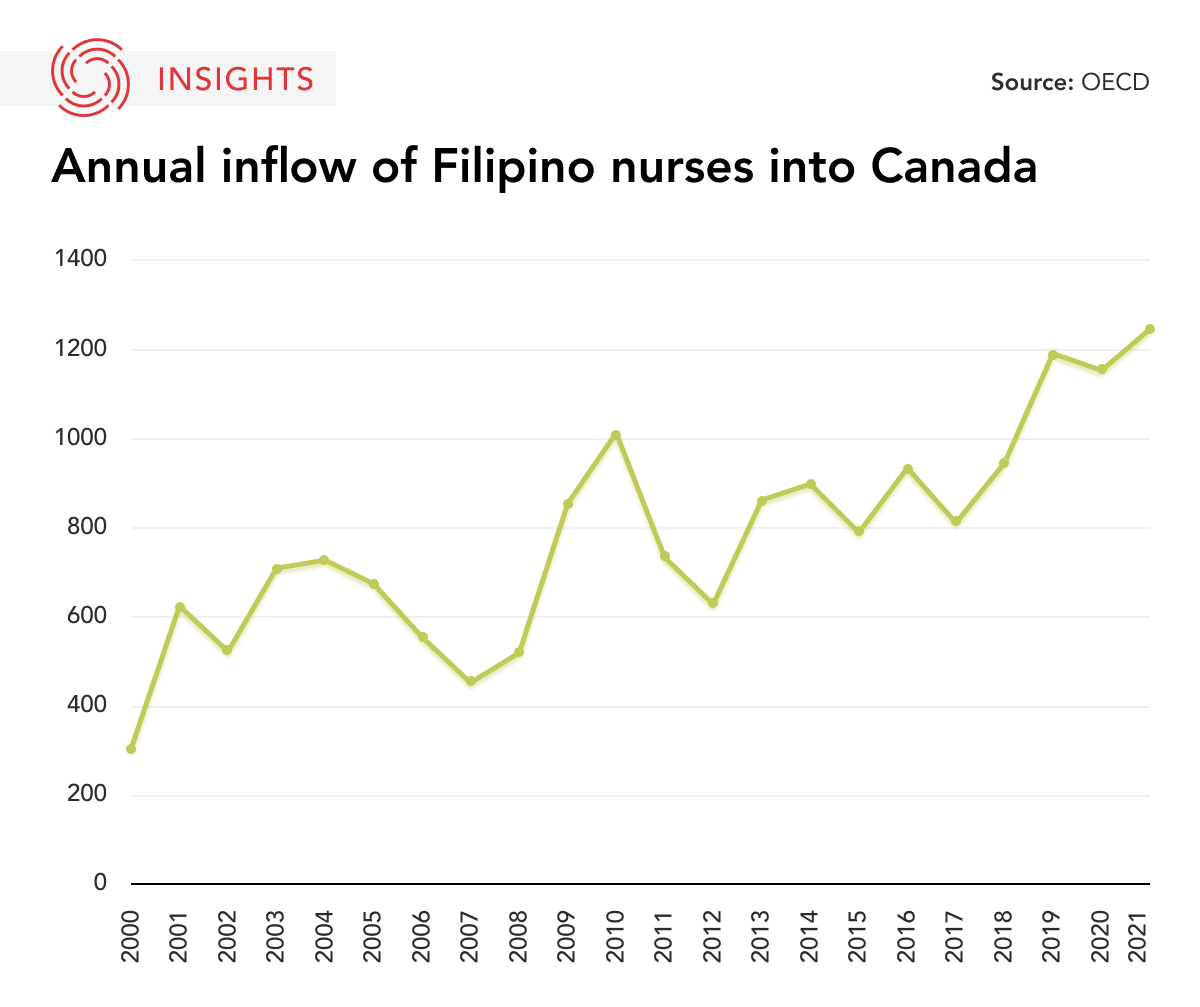The Takeaway
Low pay, long working hours, and a lack of benefits are deterring licensed Filipino nurses from working in public hospitals in the Philippines, resulting in nearly 4,500 unfilled positions. Newly appointed secretary of the Department of Health (DOH) Teodoro Herbosa has proposed deploying unlicensed graduate nurses to fill the vacancies. But nursing advocacy groups are rallying against Herbosa’s idea, arguing that the government should instead provide better wages and benefits to retain and hire licensed nurses and counteract the mass exodus of Filipino nurses.
In Brief
To pass the nursing exam in the Philippines, students must score at least 75 per cent. On June 19, Herbosa proposed issuing temporary licences to those who scored between 70–74 per cent on the exam. These new nurses would be hired at an entry-level monthly salary of C$877 (36,619 Philippine peso). They would perform limited tasks under the supervision of licensed nurses and would be given a timeline to retake and pass the exam.
Following Herbosa’s announcement, the Professional Regulation Commission (the national licensing and regulatory agency for the practice of regulated professions) pointed out that, per the Philippine Nursing Act 2002, the health secretary cannot issue temporary work permits to nurse graduates who did not pass the licensure exam. Such temporary permits can only be issued to foreign-licensed nurses or during national emergencies.
During a June 24 press briefing, Herbosa said his plan will be deferred until the act is amended to issue temporary permits to unlicensed nurses. As an alternative option, he proposed hiring unlicensed nurses as nursing assistants to address the staffing crisis.
Implications
The dwindling number of health-care workers in public and private hospitals in the Philippines has been a problem since the onset of the COVID-19 pandemic. Frustrated with poor pay and working conditions at home — and attracted by heightened nursing recruitment by countries such as Canada — many Filipino nurses resigned to migrate abroad for better pay and work-life balance.
As senior nurses are the primary targets of foreign recruiters, the Philippines faces a ‘brain drain.’ Senior nurses often play a critical role in training new nurses by providing guidance and mentorship. With few senior nurses available to guide the new nurses, hospitals are witnessing higher rates of quitting among new nurses due to reportedly excessive workloads and a lack of guidance.
Staffing shortages are putting a strain on the public health-care system, with many hospitals reducing services. Patients are facing longer wait times in hospitals, and some patients seeking urgent care were forced to wait for several days for a bed.
According to advocacy group Filipino Nurses United (FNU), the country has 124,000 registered nurses who can help to fill the shortage. But these same nurses have decided not to practise their profession due to low wages, job insecurity, and excessive workloads. FNU has strongly opposed the DOH’s proposal, criticizing the government for ignoring nurses’ concerns. FNU has urged the government to increase salaries, ensure adequate benefits, absorb contractual nurses full-time, and improve the current ratio of 16 nurses for every 10,000 people, which is lower than the World Health Organization’s recommended ratio of 27:10,000.
On June 13, the Philippines’s Department of Migrant Workers announced its plan to create a scholarship fund for aspiring nurses. The fund aims to provide educational scholarships to Filipinos who want to pursue nursing. Other countries looking to hire nurses from the Philippines must contribute to the fund. While the details of the program are yet to be finalized, Migrant Workers Secretary Susan Ople stated that the fine print would be negotiated in bilateral labour agreements with recipient countries. When implemented, this policy could have significant implications for countries like Canada which face similar nurse shortages and have looked to the Philippines to fill the gap.

What's Next
- Nursing advisory council
On June 26, Herbosa announced DOH’s plan to establish a National Nursing Advisory Council. The council will be led by a chief nursing officer and will address issues faced by nurses, including low salaries, the ‘brain drain,’ and work-life balance.
- Bill to increase wages
On May 12, House Minority Leader Marcelino Libanan called for the urgent approval of House Bill 5276, which aims to raise the wages of nurses appointed in government institutions and encourage them to remain in the Philippines. The proposed bill seeks to amend the 20-year-old Philippine Nursing Law. If the bill is passed, a nurse’s monthly basic salary would increase from the existing C$877 to C$1,533 (64,000 Philippine peso). The timeline for the bill to pass is unclear.




